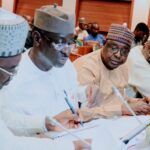… Pledges GDP growth from N23.85 tr to N40 trillion by 2029.
By Myke Uzendu, Abuja
Presidential candidate of Peoples Democratic Party (PDP) Atiku Abubakar has disclosed that one of the major legacies the ruling party will bequeath to Nigerians at the end of it’s regime is poverty.
The number of Nigerians living in poverty stands at over 133 million, the National Bureau of Statistics (NBS) announced Thursday. It said the figure represents 63 per cent of the nation’s population. The NBS disclosed this in its “Nigeria Multidimensional Poverty Index”.
Phrank Shaibu, Special Assistant, Public Communication to Atiku Abubakar while briefing journalists on Thursday at the Atiku Abubakar Campaign office in Abuja pointed out that data by governmental and non governmental organisations have underlined the fact that the number of Nigerians living in poverty is alarmingly high.
According to him, “latest report by the National Bureau of Statistics about the multidimensional height of our poverty level calls for concern, more so that, in Buhari’s Nigeria, there have been no convincing measures being taken to indicate that anything concrete is being done about it.
“Included in this troubling reality is that over 23 million youths, mostly educated and potentially productive, are unemployed”.
Shuaibu said that the development portends a threat to the security and stability of Nigeria.
Throwing more light on the situation, he continued, “From the monetary perspective, the Central Bank of Nigeria, whose job it is to check inflation claims that it is doing its best to ensure that the overall prices for goods and services remain low, stable and predictable even as records on the ground point to the contrary.
“Although the Buhari administration claims to be empowering potential investors, big and small so as to improve people’s lives, records show that 54.7 percent of Nigerians are financially excluded due to low level bank penetration in the country, and that beside the 916 Microfinance Banks, the 24 ‘big banks’ have only a little over 6000 branches, mostly concentrated in a few urban centres.
“To worsen matters, the social safety net scheme introduced by the federal government in 2016, to tackle poverty and hunger has not made any significant impact owing to poor implementation, corruption allegation and politicization”.
He said that only a sensible government will reckon that by redirecting public expenditure away from recurrent expenses and unnecessary consumption back to capital projects, the government can have positive impact on incomes and employment.
According to him, such newly-employed individuals can in turn pay their bills, rent and essentials, thus providing income to the farmers, herdsmen, landlords and the like.
He said that the PDP Presidential candidate has come up with a plan that can turn around the economic fortunes of the country.
“Industrial policy, the kind that is encapsulated in Alhaji Atiku Abubakar’s blueprint, is another area to concentrate on. A nation of 200 million people cannot abandon its manufacturing sector in favour of importation. We must ensure that most of what we eat, drink, wear or otherwise use on daily basis are locally produced, thereby creating local employment and saving foreign exchange.
“The current policy thrust may give government additional revenue but it is actually wasting scarce resources and generating more jobs and incomes for foreign countries.
“Even within the industrial sector, more employment opportunities need to be created. The worn excuse that the sector does not generate much employment because it is capital intensive has been discredited by the example of big countries like Russia and Brazil, as well as small ones like Trinidad and Tobago.
“So far, we seem to focus mainly on what taxes, fees or royalties we can extract rather than developing the upstream and downstream sectors, through the creation of integrated complexes to provide chemicals, plastics and other industrial inputs for our industrial uses and export. The days of simply exporting crude should by now have been over.
It is for the purpose of departing from Buhari’s legacy of poverty that Atiku’s policy document code-named Unity-SEED, which stands for Unity, Security, Economy, Education and Devolution of power to states and local governments lays emphasis on promoting diversification and linkages between agriculture, industry and micro and small enterprises”.
He said that although the People’s Democratic Party (PDP) presidential candidate believes that the oil sector shall remain key to Nigeria’s development as it continues to provide fiscal resources for investment in economic and social infrastructure, his plan is to give priority to the promotion of sustained non-oil sector growth and enhanced linkages between the oil and non-oil sectors.
“In pursuit of a policy of diversification, Atiku shall support the development of a commercially-driven, technology -proficient agriculture which ensures food security and interfaces with the manufacturing sector for the supply of raw materials. The policy document projects increased agricultural output from the current level of N23.85 trillion to about N40 trillion by 2029. This would imply an annual growth in agricultural sector from 4.11% to 10% between 2023 and 2029”.
He said that with Waziri Adamawa, agriculture will become the most viable sector just as unemployment and low income will to be properly tackled. He said that agriculture still provided most revenue for people as their only employment and source of income, and contributed more to GDP than the petroleum sector.
He said that Nigeria need to concentrate on employing more people in that sector to boost production and productivity.
“Critical to this is the creation of linkages between agriculture and industry, modernizing farming and animal husbandry, providing inputs and improved varieties as well as developing and providing cheap implements, as part of the overall strategy to reverse Buhari’s legacy of poverty”.



